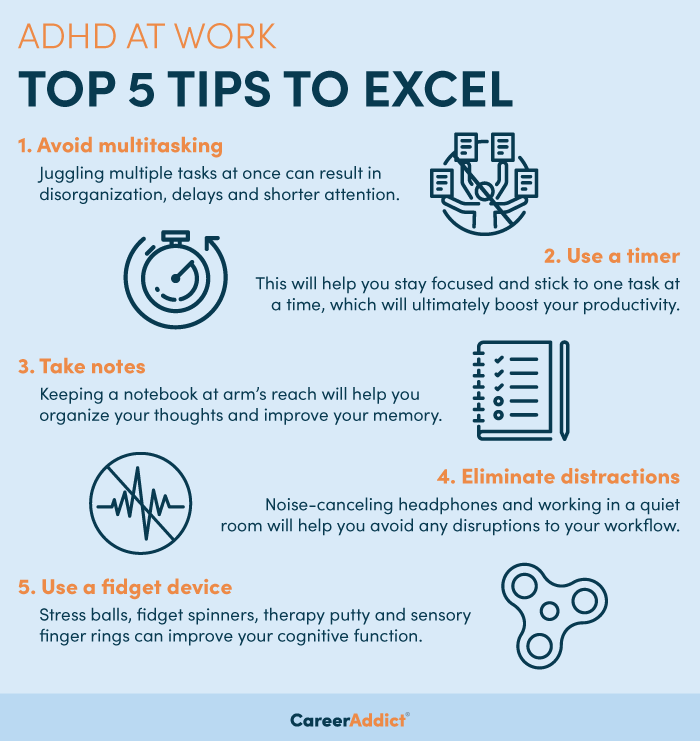
10 Essential Tips for Thriving with ADHD in the Workplace
January 11, 2024 - Reading time: 7 minutes
ADHD is characterized by difficulty concentrating, impulsivity, hyperactivity, and restlessness. These symptoms may manifest differently in each individual but can lead to difficulties with organization, time management, and prioritizing tasks.
Individuals with ADHD may face unique challenges in a professional setting. These can include difficulty focusing during meetings, struggling to complete tasks within deadlines, and difficulties maintaining organization.
1. Establish Routines:
Creating daily routines helps individuals with ADHD maintain structure and predictability in their lives. This can include setting specific times to start work, take breaks, and finish tasks.
2. Break Tasks into Smaller Steps:
Breaking large projects or tasks into smaller steps can make them more manageable for individuals with ADHD. This approach allows them to focus on one step at a time, reducing feelings of overwhelm and increasing productivity.
3. Use Visual Aids:
Visual aids such as color-coded calendars, to-do lists, or post-it notes can help individuals with ADHD stay organized and focused on their tasks.
4. Prioritize Tasks:
Prioritizing tasks based on urgency, importance, or deadlines can help individuals with ADHD focus on what truly matters and avoid becoming overwhelmed by less critical tasks.
5. Use Time Management Techniques:
Time management techniques such as the Pomodoro method or time blocking can help individuals with ADHD stay focused and on-task during work hours.
6. Seek Support:
Reach out to colleagues, supervisors, or a support network when facing challenges in the workplace. Sharing experiences and seeking advice can help individuals with ADHD navigate their professional lives more effectively.
7. Advocate for Yourself:
Be open about your ADHD with colleagues, supervisors, and HR professionals. By doing so, you can create a supportive work environment that accommodates your needs and helps you succeed professionally.
With proper strategies and support, individuals with ADHD can overcome challenges and thrive professionally. By establishing routines, breaking tasks into smaller steps, using visual aids, prioritizing tasks, employing time management techniques, seeking support, and advocating for yourself, you can achieve success in the workplace.
How can I tell if my difficulty concentrating at work is due to ADHD or another issue?
If you are experiencing challenges with focus, impulsivity, and hyperactivity in your professional life, it may be worth discussing these symptoms with a healthcare provider. They can help determine whether ADHD or another condition might be causing these issues.
Are there any accommodations I can request at work to support my ADHD?
Yes, you can discuss your needs with HR or supervisors and request accommodations such as flexible scheduling, additional breaks, a quiet workspace, or the use of assistive technology. These adjustments can help create an environment that supports your success in the workplace.
How do I talk to my employer about my ADHD?
A3: Start by educating yourself on the topic and understanding how ADHD may affect your work performance. Then, approach your supervisor or HR professional with an open and honest conversation about your experiences and challenges. Share strategies you've implemented to manage your symptoms and discuss potential accommodations that could support your success in the workplace.

Can medication help me be more successful at work?
Medication can play a role in managing ADHD symptoms, but it is essential to discuss this option with your healthcare provider. They will consider the potential benefits and side effects of any prescribed medications and determine if they are appropriate for you based on your specific needs.
How can I maintain a healthy work-life balance when living with ADHD?
Establishing routines, setting boundaries between work and personal life, and prioritizing self-care are essential for maintaining a healthy work-life balance. This may include creating daily schedules that separate work time from leisure activities or engaging in stress management techniques such as exercise, meditation, or therapy.
Are there any support groups or resources for individuals with ADHD in the workplace?
Yes! There are numerous online and local support groups, as well as professional organizations that focus on ADHD. Reach out to your local chapter of CHADD (Children and Adults with Attention Deficit/Hyperactivity Disorder) or join an online community like ADDitude's Facebook group for more information and resources.
How can I support a colleague who has ADHD?
Be patient, understanding, and empathetic. Offer assistance with tasks or projects when needed, provide clear instructions, and communicate openly about any concerns you may have. Encourage them to seek professional help if they haven't already done so and support their efforts in finding accommodations that work for both of you.
What are some common workplace challenges faced by individuals with ADHD?
Common challenges include difficulty focusing, staying organized, managing time effectively, and maintaining a healthy work-life balance. These issues can lead to missed deadlines, misunderstandings, or strained relationships with colleagues.
How can I advocate for myself in the workplace if my ADHD is not well understood by others?
Educate yourself on your condition and its impact on work performance. Share resources with colleagues or supervisors to help them understand what you're experiencing, and discuss potential accommodations that could support your success in the workplace.
What are some strategies for managing ADHD symptoms at work?
Some effective strategies include creating daily schedules and to-do lists, breaking tasks into smaller steps, using organizational tools like calendars or planners, taking regular breaks, and seeking support from colleagues or supervisors when needed.
In conclusion, living with ADHD in the workplace can be challenging but not impossible. By understanding your condition, educating others about it, implementing strategies to manage symptoms, and advocating for yourself, you can find success at work despite having ADHD.
Resources
About
You can read reviews online, check with the Better Business Bureau, or ask for references from people you trust. When you've narrowed down your options, contact the centre to ask about their process and fees. Once you've found a qualified assessment centre, they will be able to help you determine if your child has ADHD and develop a treatment plan.
